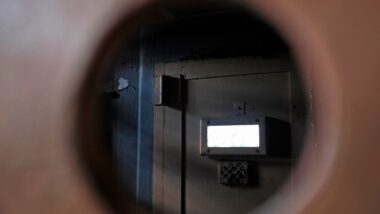A proposed class action lawsuit has been filed alleging authorities have illegally strip searched Canadian federal prison inmates hundreds of thousands of times over a span of nearly three decades.
A statement of claim registered in Ontario Superior Court says the federal Corrections and Conditional Release Act restricts strip searches only to situations when an inmate may have had contact with drugs or other contraband. Strip searching inmates without suspicion that they have had potential access to contraband is not allowed.
The illegal strip search class action lawsuit accuses federal authorities of administering strip searches excessively. The strip searches are occurring in cases when inmates exit a prison or a secure area, when they enter a family visitation area, or transfer to another prison.
The illegal strip search class action lawsuit was filed by two former federal prison inmates against the federal government and argues that strip searches serve as a “serious deprivation of liberty.”
Prison staff can strip-search inmates legally under federal law, only if they possess reasonable evidence to suspect an inmate has contraband or drugs on their body. Routine strip searches can also be performed by prison staff when an inmate enters or exits a “structured intervention unit,” which have replaced solitary confinement cells.
Michael Farrell and Kim Major, the two plaintiffs, say that their bodies — including their genitals and buttocks — were examined at random by prison staff without any suspicion or evidence of misconduct, according to the statement of claim.
“These are not trivial intrusions. The class members were forced to remove all of their clothing, bend over, spread open their buttocks, manipulate their genitalia, remove soiled tampons, and/or cough while squatting naked in front of others,” reportedly states the claim.
The plaintiff’s lawyers say that their clients have been violated by this situation an excessive number of times. They claim that strip searches have been habitual and occurred “hundreds of thousands of times” on prison inmates “and has thus violated their rights under the common law and the Canadian Charter of Rights and Freedoms.”
These claims have yet to be proven in court. A class action lawsuit must be investigated and verified by a judge before it can continue.
Michael claims he was strip searched by prison staff often. Michael faced sexual and physical abuse as a child while he was living in foster homes and says this was a traumatizing experience to endure, according to the illegal prison strip searches class action lawsuit.
Michael’s lawyers claim that he was needlessly strip searched each time he was brought from one prison to another. The excessive strip searches occurred each time he exited the first prison and again when he entered the second prison, even though he had no chance of obtaining contraband during the transfer.
Kim also faced sexual abuse as a young child and then later on by her husband, according to the statement of claim. Kim served prison time for fraud charges and now resides in southern Ontario.
The statement of claim states she was made to strip naked, and even asked to remove her dentures, each time she left the prison to go to medical appointments, when she was transferred to other prisons, and upon her release. According to the illegal strip search class action lawsuit, Kim risked punitive actions or physical force if she protested the staff’s demands.
“These strip searches have caused deep emotional scars and exacerbated her pre-existing trauma,” the claim says.
Co-counsels Deshman and Elson contend that strip searches are violations of individual liberty.
“The strip searches also engaged the right to security of the person,” said the claim. “The strip searches violated the class members’ physical and psychological integrity and caused significant harm.”
Elson reportedly said illegal strip searches make the public less safe, in turn, because “they psychologically scar prisoners, making rehabilitation harder and reoffending more likely,” he said.
The illegal strip search class action lawsuit requesting an end to unnecessary strip searches that are not authorized by federal law and compensation for the prospective class members.
In 2012, a settlement was reached in a class action lawsuit that claimed patients at a hospital in Nova Scotia were needlessly strip searched. The class members were found to be entitled to a payment of $5,000 each.
The Correctional Service of Canada said it is currently reviewing the statement of claim.
What do you think about this proposed illegal strip search class action lawsuit? Does the alleged strip searching seem excessive? Tell us your thoughts in the comment section below!
The plaintiffs are represented by Abby Deshman of the Canadian Civil Liberties Association and Kent Kent Elson of Elson Advocacy.
ATTORNEY ADVERTISING
Top Class Actions is a Proud Member of the American Bar Association
LEGAL INFORMATION IS NOT LEGAL ADVICE
Top Class Actions Legal Statement
©2008 – 2026 Top Class Actions® LLC
Various Trademarks held by their respective owners
This website is not intended for viewing or usage by European Union citizens.

















13 thoughts onClass Action Lawsuit Alleges Illegal Strip Searches in Canadian Prisons
I would like to add my name to the Illegal strip search practises within CSC, I was Incarcerated from 1992 to 2019, I am now on parole. While I was incarcerated I was subjected to strip searches every time I was placed in segregation, transferred to other institutions and attending visits. As well as institutional lockdowns.